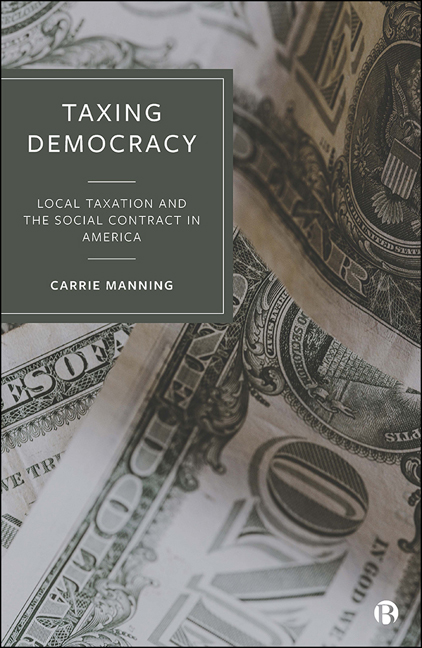Book contents
- Frontmatter
- Contents
- Acknowledgments
- 1 Taxes and the Social Contract
- 2 States, Taxes, and the Polities They Create
- 3 The US Tax State and the Limited Social Contract
- 4 Tax and Expenditure Limitations vs. an Expanding Social Contract
- 5 Implications of the Reliance on Fines and Fees
- 6 Taxing Democracy: Conclusions
- Notes
- References
- Index
6 - Taxing Democracy: Conclusions
Published online by Cambridge University Press: 20 January 2024
- Frontmatter
- Contents
- Acknowledgments
- 1 Taxes and the Social Contract
- 2 States, Taxes, and the Polities They Create
- 3 The US Tax State and the Limited Social Contract
- 4 Tax and Expenditure Limitations vs. an Expanding Social Contract
- 5 Implications of the Reliance on Fines and Fees
- 6 Taxing Democracy: Conclusions
- Notes
- References
- Index
Summary
This book has sought to use concepts of state formation and the social contract to understand the relationship between taxes and democracy. It has traced the development of the US tax state in terms of theories of state formation. It has offered a conceptual framework for understanding a longitudinal process of democratic development in which tax models act as a brake on the expansion of the social contract. The objective was to offer a new perspective on tax policy as being deeply rooted in the history of state formation and consolidation.
The tax bargain governing the US tax state rests on a set of dynamic and overlapping social contracts at federal, state, and local levels. At each level, the social contract, while dynamic and responsive to exogenous influences and to the ideological narratives of dominant political interests, also carries forward and reproduces power dynamics (and their ideological justifications) that shaped the state at its time of formation. Regional differences in the resource bases and relative power of key economic agents, differences in how states elicited consent or compliance (universal suffrage, limited machine politics, or Jim Crow politics), and differences in their administrative capacity were all influential in determining the shape and strength of the tax bargain. The tax bargain, in turn, creates path dependency by generating narratives used by politicians to shape citizens’ views of what kind of taxes are legitimate, who is justly marginalized, and so on. In other words, a tax bargain, once reached, is durable and exerts material consequences in the world.
The book has argued that tax policies embed and carry forward an implicit social contract that defines the formal boundaries of a political community, who is considered a full citizen and who is not, the public goods and services local government is expected to provide, and what citizens must give up in exchange for those goods and services.
- Type
- Chapter
- Information
- Taxing DemocracyLocal Taxation and the Social Contract in America, pp. 108 - 121Publisher: Bristol University PressPrint publication year: 2023

